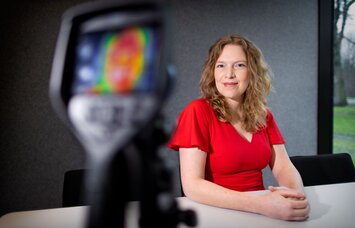During her work at the Sanquin blood bank, the neuroscientist saw blood donors faint even before the needle was inserted into their arm. It wasn't blood loss, but fear of needles that affected these people. This while the available interventions are strongly focused on preventing fainting after donation. The first time Huis in 't Veld experienced such an incident, she had just asked the donor how she felt at that moment. I feel fine,' was her answer. But within less than a minute she dropped out.
Common problem about which little is known
Huis in 't Veld became intrigued by the topic: "Through my work as a neuroscientist, I was always interested in how your brain and your body work together and what happens when you experience certain emotions. And then mainly, how we can measure and capture those sensations without depending on people's verbal responses." Add to that the fact that it is estimated that 30 percent of people suffer from fear of pricking and you can understand why Huis in 't Veld decided to look for a solution.
Despite the fact that prick fear is a common phenomenon, little is known about it. Huis in 't Veld combines the scarce information from neuroscientific literature with the knowledge she acquired during her PhD research into changes that emotions bring about in your face, body and brain. It led to the hypothesis that it is unconscious processes in the brain and autonomic nervous system that cause people to become unwell when they receive a jab. "Because this happens unconsciously, you can't very well ask people about it. Just like that first time I saw someone faint. If you want to tackle the problem, you have to develop something that can measure whether someone is anxious and going to be unwell before the person in question realizes it. Because by then it's often too late."
Biofeedback
It is therefore the preliminary stage - the period when anxiety builds up - that the neuroscientist began to focus on. She found the solution in biofeedback. This technique makes subconscious brain processes visual, showing what an individual is feeling. "If people can see what's happening in their bodies, they can learn to influence that," Huis in 't Veld explains. "How you do that is different for each person. Meditate or think about something nice, for example."
Money for research comes in the form of a Veni grant, part of the Talent Programme of the Netherlands Organisation for Scientific Research (NWO). "With that grant in my pocket, I ended up at Tilburg University and MindLabs. The Department of Cognitive Science and Artificial Intelligence is the ideal place to do neuroscience research. Among other things, with the help of a thermal imaging camera. That measures what changes occur in the face when a blood donor becomes unwell."
From scientist to entrepreneur
The idea for a game app slowly emerges. Huis in 't Veld uses the data from the thermal imaging studies to develop AINAR's algorithm. The app is a 'Slide and fly' game. A relatively simple game in which you move an armadillo over hills by swiping. Meanwhile, smartphone cameras analyze the user's face. Does the algorithm detect small signs of anxiety or stress? If so, this is made visible to you on the basis of weather phenomena. Huis in 't Veld explains: "There is a good chance that you subconsciously feel a little less good when it is dark and rainy. The assignment: make sure the sun starts shining behind the mountains."
What Huis in 't Veld has learned over the past few years of development? "That doing research and starting a business are very different from each other!" The researcher is therefore happy that she also has a master's degree in Business Administration. "This allows me to think more commercially." Another success factor is the team she has now gathered around her, she says. "Like PhD student Judita Rudokaité, who writes the algorithm. Co-promoter Sharon Ong, whose specialty is distilling data and patterns from biomedical images. And co-founder Cindy van Goor, who has years of experience in healthcare and knows exactly how to take a project-based approach to technological innovations."
Future plans
AINAR is still in development. Game developers are currently improving and making the game more fun based on feedback from a test group. And in the Elisabeth-TweeSteden Hospital (ETZ) in Tilburg, among other places, the app will soon be tested on patients. The research that is being used to further optimize the algorithm will continue until at least 2023. After that? "Then I would like to use the app with children, because the problem of fear of needles is much greater in children. And perhaps we will soon be using the algorithm for other issues as well. I still have lots of ideas to make an impact as an academic entrepreneur."

